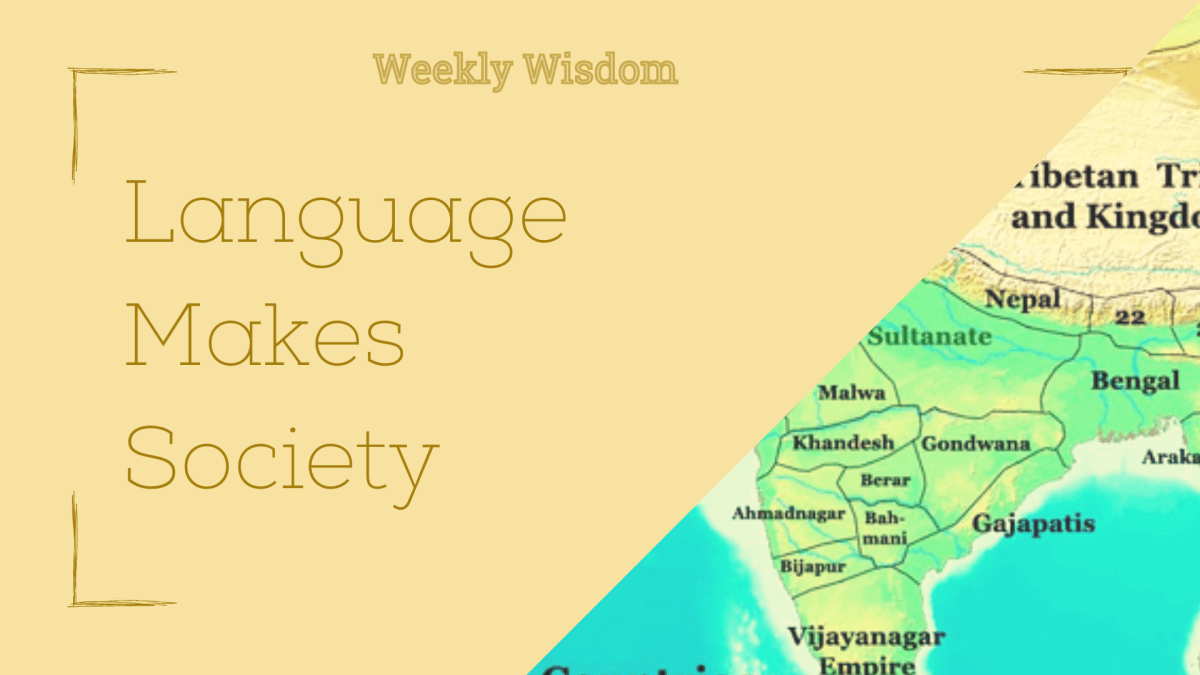Hello Subscribers, New and Old.
Welcome to Weekly Wisdom, your weekly dose of highlights, quotes and notes from my notebook. If you would like to receive this in your inbox, subscribe now. If you want to support, do checkout the links in the Friends of Weekly Wisdom Section.
It’s been a while. I have been busy with work and had some minor health issues. Hopefully the schedule would be more regular from this week. The floods in Pakistan are still causing misery to millions. Please help in anyway you can.
💡Something I learned
Language and Society
Language is an obsession of mine. Not just linguistics. I grew up in a multiethnic, urban environment. Not the simplistic european notion of ethnicity. I mean real diversity that can only come centuries of migrations, intermingling, and imperialism. You can’t discriminate people based on skin color. So language became the primary marker for delineating groups.
‘We’ spoke Urdu, but ‘they’ spoke Sindhi/Punjabi/Pashto. Unless you spoke many of the immigrant languages and dialects like Memon(my ancestral language), Gujrati, Ghanchi, etc. that came in during the Partition, you are also one of us, but a minority. Of course, these differences are arbitrary. They have no basis in reality. Your spoken language is not even a good signifier of your ethnicity.
Language is also used to separate classed. The elites speak english, while the plebian masses are too crass for the Queen’s tongue. The colonial era gave us Chai, Cricket, and an undue respect for the Germano-Latin language where the script is phonetically inconsistent for no goddamn reason. Of course, the spelling is yet another way for the upper class to shame the plebs.
All this to say that language shapes society at the fundamental level. Not just who you are, but what you are is determined on what you speak and how you speak it.
📕Somethings to read
- Who Speaks English?: An accounting of why English being the Lingua Franca has lead to the English people being a minority speakers of the language.
- *The Irreplacable*, Bee Wilson: Palm Oil is everywhere. It is in your breakfast, lunch, dinner and even desert. It is in your soap, detergent, shampoo and face-cream. It might even be powering your car. This review takes the look into its history and the nature of the trade. Also its impact on the global economy and society.
- *The artist and the machine*, Michael Nielsen: When does a photograph transforms from a mere document to art? Are the pictures taken by Mars rovers different than what Monet was trying to achieve? A great exploration of these questions by Michael Neilsen.
📺Something to watch
Why is transferring money so expensive when it is, more or less, just numbers in a database? Wendover Productions explains the costs involved in transferring money, the history of banks and how the SWIFT system works.
Friends of Weekly Wisdom
- Refind: The essence of the web, every morning in your inbox. Tens of thousands of busy people start their day with their personalized digest by Refind. Sign up for free and pick your favorite topics and thought leaders. https://refind.com/?utm_source=newsletter&utm_medium=barter&utm_campaign=FU-SmtfFzzhQJDgFEz5eiw
- The Sample: The Sample lets you try the best newsletters based on your interest. With one-click you can subscribe if you like.
🗣Some Quotes and Notes
Data is part of the picture
I believe in Data. I think we can make good decisions with the help of quantifiable information. The operative terms in the previous sentence are help and quantifiable. Not everything is quantifiable. And the measurements themselves are a means, not an end. This article makes a great case for being convincing beyond data.
The champions of data are always careful to list all the caveats of measurement, but the implicit assertion is that metrics are useful in the common case; it is the exceptional case where measurement is inappropriate. I claim that the exact opposite is true. The common case is that you can’t measure what you want to measure, you can only measure a proxy and in order to meaningfully interpret even that, you either need to run an experiment that you probably don’t have the resources to run, or do statistics that you probably don’t have the expertise to do.
— Be good-argument-driven, not data-driven, Richard Mamorstein
Moral Transactions
This short-essay has some good arguments on treating economics as moral philosophy. I am not entirely convinced, but it is worth pondering.
Globalization specifically capitalizes on the lack of responsibility that shareholders feel, not only to their employees, but to the entire society. It is fundamentally an abdication of moral responsibility.
Globalism conditionally subverts local morality because that’s exactly what it capitalizes on. Economics has always been a moral philosophy, and it could never be anything else.
—- Economics as a Moral Philosophy, “J”
Don’t eat frogs
‘Eating frog’, ‘bend the knee’, ‘eating shit’, etc. Call it what you will, it is something we all have to do eventually. However, the current productivity culture has an expectation for us to eat frogs every day, every minute, and every second. This passage illustrates why high-achieving students burnout after eating all the frogs.
These were students who had eaten enough frogs to get into Princeton and Harvard. Their reward was––surprise!––more frogs. So they ate those frogs too. And now they’re staring down a whole lifetime of frog-eating and starting to feel like maybe something, somewhere has gone wrong. But they don’t know what else to do. They’ve so thoroughly subjugated their desires that they don’t even know what their desires are anymore.
— Excuse me but why are you eating so many frogs, Adam Mastroianni
Thank you for joining me this week. If you know some who might enjoy this, please forward this email to them. See you next week.
Mudassir Chapra

